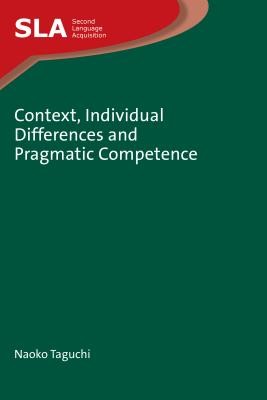
- We will send in 10–14 business days.
- Author: Naoko Taguchi
- Publisher: Multilingual Matters Limited
- ISBN-10: 1847696082
- ISBN-13: 9781847696083
- Format: 15.5 x 23.1 x 1.8 cm, softcover
- Language: English
- SAVE -10% with code: EXTRA
Context, Individual Differences and Pragmatic Competence (e-book) (used book) | bookbook.eu
Reviews
Description
Pragmatic competence plays a key role in the era of globalization where communication across cultural boundaries is an everyday phenomenon. The ability to use language in a socially appropriate manner is critical, as lack of it may lead to cross-cultural miscommunication or cultural stereotyping. This book describes second language learners' development of pragmatic competence. It proposes an original theoretical framework combining a pragmatics and psycholinguistics approach, and uses a variety of research instruments, both quantitative and qualitative, to describe pragmatic development over one year. Situated in a bilingual university in Japan, the study reveals patterns of change across different pragmatic abilities among Japanese learners of English. The book offers implications for SLA theories, the teaching and assessment of pragmatic competence, and intercultural communication.
EXTRA 10 % discount with code: EXTRA
The promotion ends in 20d.15:14:14
The discount code is valid when purchasing from 10 €. Discounts do not stack.
- Author: Naoko Taguchi
- Publisher: Multilingual Matters Limited
- ISBN-10: 1847696082
- ISBN-13: 9781847696083
- Format: 15.5 x 23.1 x 1.8 cm, softcover
- Language: English English
Pragmatic competence plays a key role in the era of globalization where communication across cultural boundaries is an everyday phenomenon. The ability to use language in a socially appropriate manner is critical, as lack of it may lead to cross-cultural miscommunication or cultural stereotyping. This book describes second language learners' development of pragmatic competence. It proposes an original theoretical framework combining a pragmatics and psycholinguistics approach, and uses a variety of research instruments, both quantitative and qualitative, to describe pragmatic development over one year. Situated in a bilingual university in Japan, the study reveals patterns of change across different pragmatic abilities among Japanese learners of English. The book offers implications for SLA theories, the teaching and assessment of pragmatic competence, and intercultural communication.


Reviews